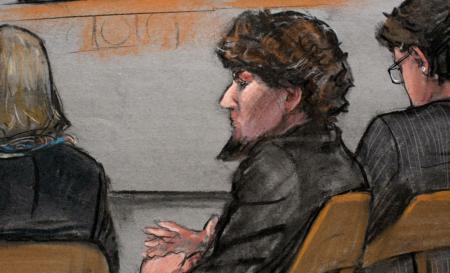Crime and punishment -- here and now
Last week a Bristol County jury found former New England Patriot Aaron Hernandez guilty of first-degree murder, for which he received a mandatory sentence of life imprisonment without parole. Still pending is his trial for a couple of other murders he is charged with in the Boston area. The death penalty is not in play for him, because Massachusetts abolished the death penalty years ago for crimes under state law.
On March 21, the day after the Boston Marathon was run on Patriots Day, the penalty phase of the trial of Dzohkhar Tsarnaev began in Boston Federal Court. He was recently found guilty of 30 counts of violating federal law in the Marathon bombing of a couple years ago, and 17 of those counts carry a possible death penalty. And so testimony is being taken, and the jury will decide whether he gets the death penalty. Why does he qualify, but Hernandez doesn't? The reason is that federal law allows for the death penalty for federal crimes involving homicide, whereas state law doesn't for state crimes, no matter how horrendous. How fair is that?
Polls show that most of the people in Massachusetts are opposed to the death penalty in the Marathon bombing case, and the Catholic bishops of Massachusetts, together with Cardinal Sean O'Malley, have expressed their opposition; as have the parents of 8-year-old Martin Richard, the poster-boy of an innocent victim, who was brutally killed in the bombing. As the Richards' eloquently wrote, "the continued pursuit of that punishment could bring years of appeals and prolong reliving the most painful day of our lives."
My own thinking on the death penalty has evolved from unenthuastic support to virtually total opposition, largely because of the leadership of St. John Paul II in developing Catholic teaching on the subject. We Catholics are unequivocally pro-life with respect to the unborn and the elderly, indeed all innocent human life; and to extend the pro-life stance to all human life, to encompass even those guilty of serious crimes, seems doable and more in keeping with the intrinsic value of human life. Tsarnaev can be rendered incapable of further mayhem by life imprisonment. Honoring human life, however innocent, by directly taking human life, however guilty, seems to enter a vicious circle of violence. I don't know about you, but I get queasy thinking about official methods of execution, whether by electric chair, lethal injection, hanging or guillotine.
I also think about the ramifications of God's word on the subject. St. Paul quotes Deuteronomy in his Epistle to the Romans: "Do not take revenge, my dear friends, but leave room for God's wrath, for it is written: 'It is mine to avenge; I will repay,' says the Lord." (Rom 12:19). Or the words of the prophet Ezekiel, "Have I any pleasure in the death of the wicked, declares the Lord God, and not rather that he should turn from his way and live?" (Ez 18:23)
Dzokhar Tsarnaev participated in doing something truly monstrous and despicable: killing and maiming innocent human beings in a terrorist act -- ostensibly in revenge for our country's killing of Muslims abroad. According to the note he left in the boat, he saw his brother as a martyr; and he expressed a desire himself to be a martyr for jihad. It seems that posture is his current attitude, judging from his demeanor at trial. Putting him to death may tend to validate that crazy perception, at least in the Muslim world. But with the time a life sentence would give him, together with maturity of years, he may come to realize the true horror of his crimes, that this was no video game, and that even the ostensible death of innocents is never a valid reason to kill other innocents. And so he could conceivably repent of his crimes, which would be vastly preferable to having him die in his sins.
We cannot bring the victims back to life or restore their lost limbs. We can, however, stop the further shedding of blood in this matter. I think it could be just to execute him, but it would be better -- more merciful -- not to.
DWIGHT G. DUNCAN IS PROFESSOR AT UMASS SCHOOL OF LAW DARTMOUTH. HE HOLDS DEGREES IN BOTH CIVIL AND CANON LAW.
- Dwight G. Duncan is professor at UMass School of Law Dartmouth. He holds degrees in both civil and canon law.



















